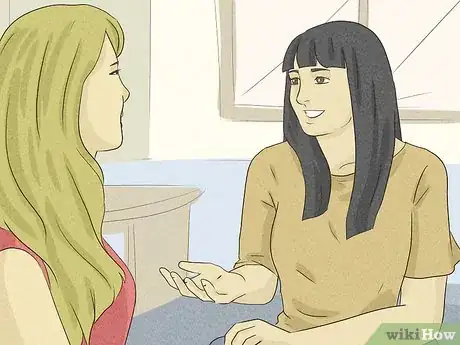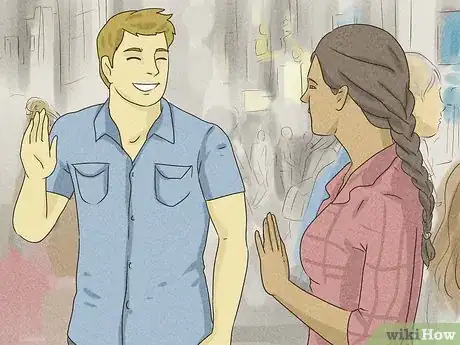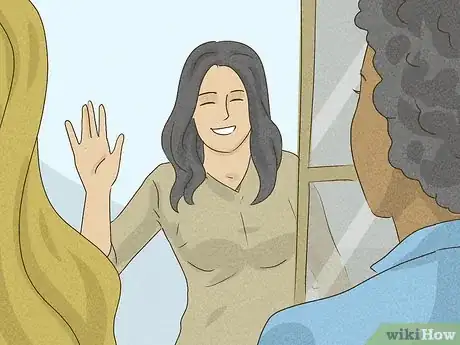This article was co-authored by Sheila A. Anderson. Sheila A. Anderson is a Certified Image Consultant, International Branding Icon, and the Founder of Image Power Play, an impression management and personal branding company. With over three decades of experience, she specializes in empowering corporate professionals to raise their personal image to meet the value of their brand. Sheila is a Certified Image Consultant with The Image Resource Network and a Certified Universal Style Consultant with The Universal Style International. Sheila is a member of the C-Suite Network Advisors and the author of the book, I.C.U., The Comprehensive Guide to Breathing Life Back Into Your Personal Brand.
There are 15 references cited in this article, which can be found at the bottom of the page.
This article has been viewed 455,608 times.
Are you the girl who has accidentally walked into a screen door in front of a room full of people, or the guy who was babbling on to his crush and ended up talking about his pet rock collection? If so, worry not -- awkwardness is a part of life, and everyone has worried about how to be less awkward at some point. If you want to feel less self-conscious and improve your social interactions, just follow these steps.
Steps
Be Less Awkward in General
-
1Put yourself out there. If you already feel too awkward to even know how to properly greet your next-door neighbor, then the last thing you probably want to do is to put yourself out there and spend more time interacting with people. However, the more time you spend with people, the more comfortable you'll be socially, and the less afraid you'll be of saying or doing the wrong thing. Make a goal of spending more time with people and less time holed up at home.[1]
- Meet a variety of people through different networks, such as the school newspaper, the tennis team, or a youth group, and learn how to hang out with people with different interests and backgrounds.
- If you don't feel like you thrive in a group environment, invite a friend or an acquaintance for coffee or a small outing first. Getting to know people on an individual level can help you build the confidence to hang out in a group setting.
- Don't be silent. You can still not be putting yourself out there even if you're in a room full of people. Though you don't have to try to be the belle of the ball, if you're the shy sort of awkward, then make it a goal to speak up a bit more and to make your presence known so you're more comfortable with people reacting to you.
-
2Stop caring what people think -- or look like it. Though it's impossible for anyone, even Justin Bieber or Brad Pitt, to ever fully stop caring about what people think, you can still make an effort to care less about what people think about you. If you're paralyzed by the thought of doing something wrong because you don't want to offend, bore, or annoy anyone around you, then you'll never be able to overcome your social awkwardness.[2]
- The next time you talk to someone, tell yourself that you're taking a risk and being dynamic, and that it's better to get the reaction you want than to do nothing.
- People can also tell if you're obsessed with what they think if you're constantly asking questions about what they think. If you always say things like, "Do you think my new haircut sucks?" or "Do you think I should stop playing the cello?" then you'll look like you don't have a mind of your own.
- If you stop caring about what people think, you'll be on your way to developing your confidence and sense of self. Working to meet your private goals and doing the things you love is a lot more important than pleasing the people around you.
- Don't let people catch you checking out your reflection in a window or staring at yourself in the mirror. This will make it look like you're overly-concerned with your image.
Advertisement -
3Develop your confidence. Though developing your confidence is easier said than done, you need to work on improving your self-worth if you want to be less awkward. Part of being awkward stems from feeling like you just don't "get it," and don't know how to act around people who all look like they know what they're doing. Well, until you see that you're not any worse than the people around you, you won't be able to interact with others on an equal playing field.[3]
- Take pride in doing the things you love. Whether you love classic movies, building model planes, or running, you should spend time doing the things you enjoy to improve your sense of self.
- Though no perfect wardrobe or haircut will actually make you feel confident, taking the time to shower, groom yourself, and offer a presentable face to the world will make you feel better about yourself for sure.
- Hang out with people who make you feel good about yourself instead of the people who put you down. Part of the reason you may be feeling awkward around other people is because the people you're with don't make you feel valued.
-
4Get a grip on social norms. Another reason that people feel awkward is because they feel like they just don't know what to do in a social situation, and find themselves constantly saying something inappropriate or misreading social cues. Well, there's no handbook that can teach you exactly how to understand social norms and to be less awkward, but there are a few things you can do to get a better grip on social norms:[4]
- If you have a friend or just an acquaintance who has amazing social skills, try to spend more time around that person to get a better understanding of how he pulls it off.
- If you did something that really offended someone or just failed socially, make a note of it so you can avoid it the next time around.
- Learn to read the dynamics of situation before you jump into it. If people are joking around in a group, it's not the time to talk about the hard math test coming up. On the other hand, if one person is talking about how sad he is after his break-up, it's not the time to tell an off-color joke.
-
5Embrace your awkwardness. You don't have to be as cool as James Dean to make people like you. In fact, being awkward, bumbling around, and spilling food all over yourself can actually endear you to people. Though you can work on improving your social skills, you shouldn't try to be super smooth, or people will know that you're not really being yourself. Embracing your awkwardness doesn't mean saying, "I'm so awkward!" every two seconds; but it does mean being comfortable with your occasional lack of social grace.
- Learn to laugh at yourself. That will make people more comfortable around you and will be happy that you're willing to admit you're imperfect.
- You don't have to be self-deprecating to make fun of yourself occasionally using the right tone. For example, if you always spill on yourself and someone has pointed out the big awkward ketchup stain on your pants, just say, "Trust me, it's usually worse," instead of looking all embarrassed and uncomfortable.
-
6Don't show up too early or too late. Though this may sound like a small point, a lot of social awkwardness comes from bad timing. If you showed up super early to an event and are the first one there, then you may get stuck talking to the person organizing the event without having much to say, or you may feel like you're just in the way and are better standing off to the side. On the other hand, if you show up to an event way too late, everyone will have already developed their dynamic, and it may be more difficult to insert yourself into the conversation.[5]
- If you're going to a party, showing up exactly on time may make you look a little bit too eager. Show up at least fifteen minutes late if there's no rigid deadline. Of course, don't show up late if it'll look rude.
Be Less Awkward Around New People
-
1Be interested -- not interesting. This is a key rule when meeting new people. You may be obsessed with reporting the coolest fact you read on the news or you may want to wow your new acquaintance with your extensive knowledge of Italian cuisine, but if you want to have a positive social interaction, you should focus on showing interest in the other person's life instead of talking on and on about yourself.[6] Here are some ways to show interest without coming on too strong at the beginning of a conversation:[7]
- If the person is reading a book, ask him how he likes it.
- If the person is wearing a sweater with a college's name on it and you know something about the school, ask if the person went there and talk about what he thinks of it.
- You can ask the person where he or she is headed if you bump into each other, and that can strike up a conversation about that person's interests.
- Ask the person about his or her plans for the weekend.
- Try coming up with a list of questions you are comfortable asking that enables you to find out more about the other person in different scenarios.[8]
-
2Ask thoughtful and open-ended questions. When you should interest in a person, you shouldn't just ask any question that comes to your mind or the person will think you're being random or even rude. Ask questions that can lead to a long answer and show that you're putting in some effort in getting to know the person. Don't ask a question that can be answered with a simple "yes" or "no" unless you have an immediate follow-up. Here are some ways to pose a thoughtful question:[9]
- "Nice tennis racket. How long have you been playing?"
- "Mary always throws the best parties. How do you know her?"
- "I love Catcher in the Rye. Are you reading that for fun, or for school? What do you think of it?"
- "What did you think of Mr. Peterson's test? I couldn't believe how hard it was."
-
3Master the art of small talk. To get to know new people, you have to master the art of small talk. Small talk may sound silly, but it's exactly what gets you to know a person and to be able to have a more meaningful discussion as the conversation progresses. Making small talk just means being able to keep up the flow of a conversation, to learn to build from one topic to the next, and to read social cues to see what the person really want to talk about. Here are some things to keep in mind as you try to make small talk:[10]
- Make the person comfortable. Put the person at ease by smiling, not leaning in too close, and giving him all of your attention.
- Reveal something small about yourself. Say that you love watching hockey, that you grew up in Brooklyn, or that your favorite subject is history -- just give the other person something small to work with.
- Be a good listener. If the person mentions that he has a sister in passing, you can circle back to it if the subject of siblings come up; then, you can say, "You mentioned you had a sister. Are you close in age?" and the person will be impressed that you remembered.
- Engage the person. Make sure that you're asking questions and keeping the conversation moving back and forth without dominating the conversation or letting the person do all the talking.
-
4Avoid personal subjects at first. As you and the other person get to know each other, you can start to talk about more personal topics. At first, though, it's better to steer clear, or you'll risk making the other person uncomfortable. One of the reason people feel awkward is because they bring up a subject that clearly makes the other person uncomfortable but they don't know why. Here are some topics to avoid when you're talking to a person for the first time:[11]
- Serious breakups
- The death of a loved one
- Sexual experience
- Health problems you may be having
- Deep personal struggles
- Embarrassing moments
-
5Don't overshare. Oversharing is related to getting too personal. You may be the kind of awkward person who sees that the other person has nothing to say, and then compensates by talking nonstop, wondering, "How the heck did I end up talking about my grandmother's bronchitis?" Though you may think that talking about anything that comes to your mind will make the conversation keep going, it's actually better to pause and redirect the conversation in a more comfortable way. Here are some other things you should avoid mentioning to a new person unless you want to risk oversharing:[12]
- Your deepest longings
- Your deep-seated issues with your parents
- Your unsatisfying childhood
- Your feelings of sadness, loneliness, alienation, or any other deeply negative emotion
- The weird rash on your arm
- That time you got so drunk that you threw up
-
6Read the person to avoid offending him or her. You should get a sense of what the new person is like before you try out your raunchiest jokes or start harshly criticizing a past president. Remember that every person is different, and that not everybody shares your perspective on politics, religion, or even sports. Remember that you and the new person may be in a similar social circle, but that this doesn't mean that the person has the same perspective on all the people around you. Here are some topics to avoid so you don't offend a new person:[13]
- Any lewd jokes
- Harsh criticism of the current or past president
- Comments on the undoubtable/impossible existence of God
- Criticism of a person you both know
- Criticism of all the fans of an "inferior" sports team that the person might like
- Inside jokes that you share with other people
- Any general comments that would make the person think, "I guess I have to get to know this person for that weird comment to make sense..."
Be Less Awkward Around Someone You Like
-
1Don't be too eager. Being awkward around your peers and perfect strangers is difficult enough, but being awkward around someone you actually like can begin to feel impossible. Still, there are a few things you can do to have more social grace around your crush, and it starts with playing it cool and not acting like a puppy who is ready to hump the leg of anyone who comes by. Here are some ways to play it cool without looking too eager:
- Smile and say hello, but don't go in for a hug unless you're at "hug" status with the person. If you're not sure, wait for the person to initiate the hug.
- If you see the person coming down the hall, approach him or her if you're nearby, but don't run to the other end of the building just to say hi or you'll look like a stalker.
- Don't nod too vigorously at everything the person says, thinking that it will just help you show your interest. Making meaningful replies is more effective than nodding.
- Avoid laughing at every little thing the person says -- especially if he or she isn't even trying to be funny.
-
2Give meaningful compliments. To be less socially awkward, you have to be able to recognize the difference between a "creepy comment" and a "nice comment." Don't tell a girl, "You have such soft, fluffy hair. I just want to run my hands through it," unless you want her to slowly back away. Instead, say, "I like your haircut. It makes you look kind of like [insert name of cute celebrity here.]" The compliment should let the person see that you're paying attention without feeling like you're putting too much pressure on.[14]
- "You have a great smile" or "You have a great laugh" are usually safe bets.
- Complimenting a girl's dress or jewelry can make her feel special.
- Complimenting an aspect of the person's personality can work too; telling a guy he has a great sense of humor will make him feel good.
- Use your compliments sparingly. If you compliment the person every two seconds, he or she may get annoyed or even overwhelmed.
-
3Manage your body language.[15] One socially awkward move is the "close talk," which is standing so close to a person that you're practically already trying to kiss him or her. You may be doing this just because you want to show interest, but standing inches away from a person and leaning in so far that the person keeps moving back will not endear you to your love interest.[16]
- Maintain a respectable distance and use your arms to gesture occasionally to make your conversation more dynamic.
- Make eye contact but look away every once in a while so you don't come off as too intense.
- Don't reach out to touch a girl's hair unless you're invited to. It's important to respect her personal space for her to remain comfortable with you.
-
4Put the person at ease. Remember that the person you like may return your feelings and could be feeling a little awkward too. You should work on putting the person at ease by being friendly, laughing at something the person said if you know it was meant to be funny, and giving the person the reaction she wants from her statements. If she says something funny, laugh; if she's being serious, get the big grin off your face. Make the person feel like you're on the same level and that you won't be pulling any tricks.[17]
- If you're entertaining you love interest as a guest, make her feel more comfortable by offer her a drink, snacks, or a seat.
- Poking fun at yourself a bit will make the person feel more relaxed.
- If the person accidentally spills or drops something, just say, "That happens to me all the time."
-
5Know when to leave. Since social awkwardness does have a lot to do with timing, you should not only know when you should enter a conversation, but you should also know when you should leave it. If you're talking to a person you like, you should get out of the conversation before you both run out of things to say, when you're still having an easy flow of conversation, so the person will want to keep talking to you next time.
- And if the person makes it clear that you're not wanted by checking her watch or phone or looking around for her friends, then politely say goodbye.
- If you're not wanted, just say, "It's been fun talking to you" instead of, "Well, I know when I'm not wanted," which will only make things worse.
- And if you've had a good conversation, just say, "I look forward to catching up again soon" and leave with your head high.
Expert Q&A
-
QuestionHow can I be comfortable with socializing?
 Sheila A. AndersonSheila A. Anderson is a Certified Image Consultant, International Branding Icon, and the Founder of Image Power Play, an impression management and personal branding company. With over three decades of experience, she specializes in empowering corporate professionals to raise their personal image to meet the value of their brand. Sheila is a Certified Image Consultant with The Image Resource Network and a Certified Universal Style Consultant with The Universal Style International. Sheila is a member of the C-Suite Network Advisors and the author of the book, I.C.U., The Comprehensive Guide to Breathing Life Back Into Your Personal Brand.
Sheila A. AndersonSheila A. Anderson is a Certified Image Consultant, International Branding Icon, and the Founder of Image Power Play, an impression management and personal branding company. With over three decades of experience, she specializes in empowering corporate professionals to raise their personal image to meet the value of their brand. Sheila is a Certified Image Consultant with The Image Resource Network and a Certified Universal Style Consultant with The Universal Style International. Sheila is a member of the C-Suite Network Advisors and the author of the book, I.C.U., The Comprehensive Guide to Breathing Life Back Into Your Personal Brand.
Certified Image Consultant & International Branding Icon Find a friend who's willing to role play different social situations with you. This will help you feel comfortable when you're in the real world!
Find a friend who's willing to role play different social situations with you. This will help you feel comfortable when you're in the real world! -
QuestionHow can I look more friendly?
 Sheila A. AndersonSheila A. Anderson is a Certified Image Consultant, International Branding Icon, and the Founder of Image Power Play, an impression management and personal branding company. With over three decades of experience, she specializes in empowering corporate professionals to raise their personal image to meet the value of their brand. Sheila is a Certified Image Consultant with The Image Resource Network and a Certified Universal Style Consultant with The Universal Style International. Sheila is a member of the C-Suite Network Advisors and the author of the book, I.C.U., The Comprehensive Guide to Breathing Life Back Into Your Personal Brand.
Sheila A. AndersonSheila A. Anderson is a Certified Image Consultant, International Branding Icon, and the Founder of Image Power Play, an impression management and personal branding company. With over three decades of experience, she specializes in empowering corporate professionals to raise their personal image to meet the value of their brand. Sheila is a Certified Image Consultant with The Image Resource Network and a Certified Universal Style Consultant with The Universal Style International. Sheila is a member of the C-Suite Network Advisors and the author of the book, I.C.U., The Comprehensive Guide to Breathing Life Back Into Your Personal Brand.
Certified Image Consultant & International Branding Icon Keep your body language open and inviting! Be sure to make eye contact, rest your arms at your sides, keep your shoulders back, and offer a soft smile.
Keep your body language open and inviting! Be sure to make eye contact, rest your arms at your sides, keep your shoulders back, and offer a soft smile. -
QuestionHow do I get better at small talk?
 Sheila A. AndersonSheila A. Anderson is a Certified Image Consultant, International Branding Icon, and the Founder of Image Power Play, an impression management and personal branding company. With over three decades of experience, she specializes in empowering corporate professionals to raise their personal image to meet the value of their brand. Sheila is a Certified Image Consultant with The Image Resource Network and a Certified Universal Style Consultant with The Universal Style International. Sheila is a member of the C-Suite Network Advisors and the author of the book, I.C.U., The Comprehensive Guide to Breathing Life Back Into Your Personal Brand.
Sheila A. AndersonSheila A. Anderson is a Certified Image Consultant, International Branding Icon, and the Founder of Image Power Play, an impression management and personal branding company. With over three decades of experience, she specializes in empowering corporate professionals to raise their personal image to meet the value of their brand. Sheila is a Certified Image Consultant with The Image Resource Network and a Certified Universal Style Consultant with The Universal Style International. Sheila is a member of the C-Suite Network Advisors and the author of the book, I.C.U., The Comprehensive Guide to Breathing Life Back Into Your Personal Brand.
Certified Image Consultant & International Branding Icon Prepare in advance a few sentences about who you are, what you do for a living, and what you're most passionate about in life. Being able to share this info efficiently will immediately raise your self-esteem and confidence while also giving off a great first impression to others.
Prepare in advance a few sentences about who you are, what you do for a living, and what you're most passionate about in life. Being able to share this info efficiently will immediately raise your self-esteem and confidence while also giving off a great first impression to others.
References
- ↑ https://www.everydayhealth.com/healthy-living/7-ways-to-sharpen-your-people-skills.aspx
- ↑ https://www.psychologytoday.com/us/blog/where-science-meets-the-steps/201610/8-ways-stop-worrying-about-what-other-people-think
- ↑ https://www.psychologytoday.com/us/blog/thicken-your-skin/201509/the-essence-confidence
- ↑ https://www.simplypsychology.org/social-roles.html
- ↑ https://www.psychologytoday.com/us/blog/contemporary-psychoanalysis-in-action/201605/why-some-people-are-never-time
- ↑ Sheila A. Anderson. Certified Image Consultant & International Branding Icon. Expert Interview. 19 July 2021
- ↑ https://www.inc.com/anna-johansson/7-ways-to-start-a-conversation-that-leads-where-you-want-it-to.html
- ↑ Sheila A. Anderson. Certified Image Consultant & International Branding Icon. Expert Interview. 19 July 2021
- ↑ https://hbr.org/2018/05/the-surprising-power-of-questions
- ↑ https://www.forbes.com/sites/christinapark/2015/03/30/an-introverts-guide-to-small-talk-eight-painless-tips/
- ↑ https://www.psychologytoday.com/us/blog/the-couch/201311/why-people-ask-you-awkward-and-annoying-questions
- ↑ https://www.psychologytoday.com/us/blog/what-mentally-strong-people-dont-do/201607/5-reasons-we-tell-people-more-we-should
- ↑ https://www.verywellmind.com/small-talk-topics-3024421
- ↑ https://www.healthyway.com/content/the-secret-to-giving-meaningful-compliments/
- ↑ Sheila A. Anderson. Certified Image Consultant & International Branding Icon. Expert Interview. 19 July 2021
- ↑ https://www.psychologytoday.com/us/blog/dog-days/201605/personal-space
- ↑ https://www.psychologytoday.com/us/blog/fulfillment-any-age/201501/6-ways-get-more-comfortable-others-and-yourself
About This Article
Being less awkward can feel challenging, but one way to start feeling less awkward is to develop your confidence. Improve your self-confidence by spending time engaging in activities that you love like watching old movies or playing board games. You should also take the time to look and feel presentable -- dressing in a way that makes you feel better about yourself will make you more confident! Finally, surround yourself with people who build you up and make you feel valued for who you are. For more tips on how to feel less awkward, including how to read another person’s social cues, keep reading!














































































